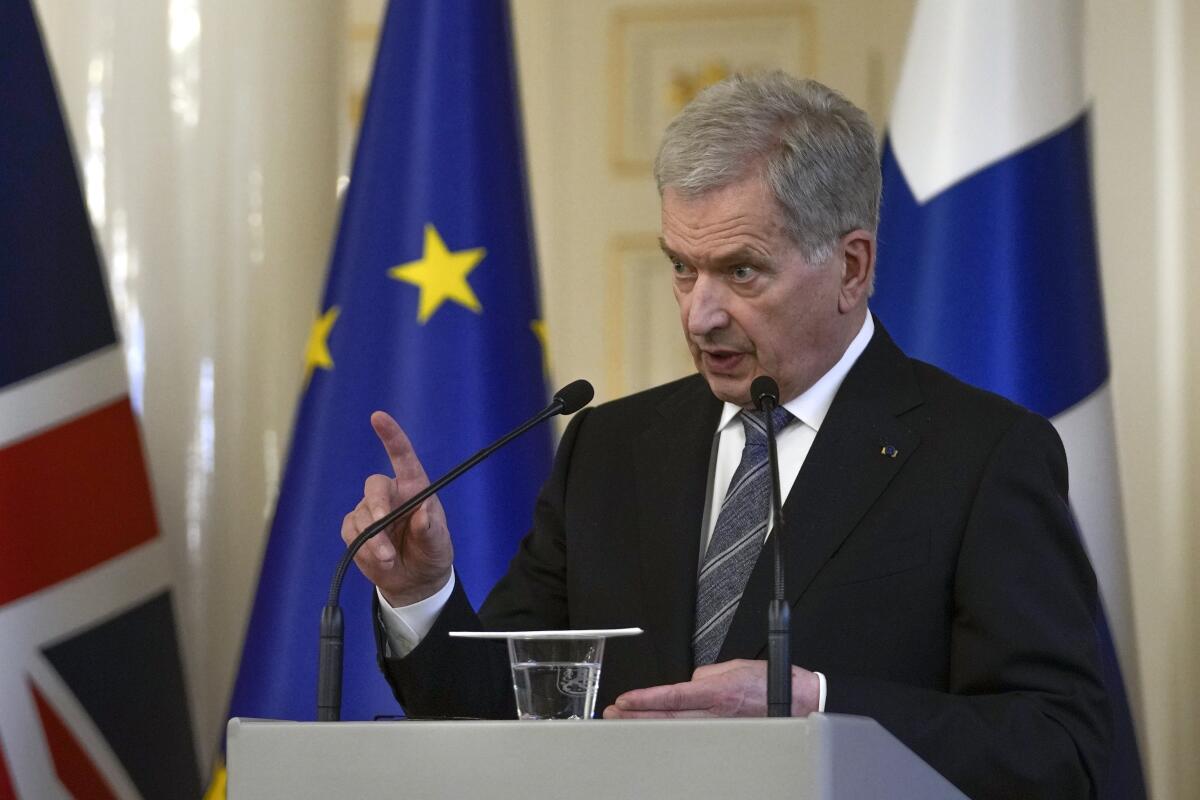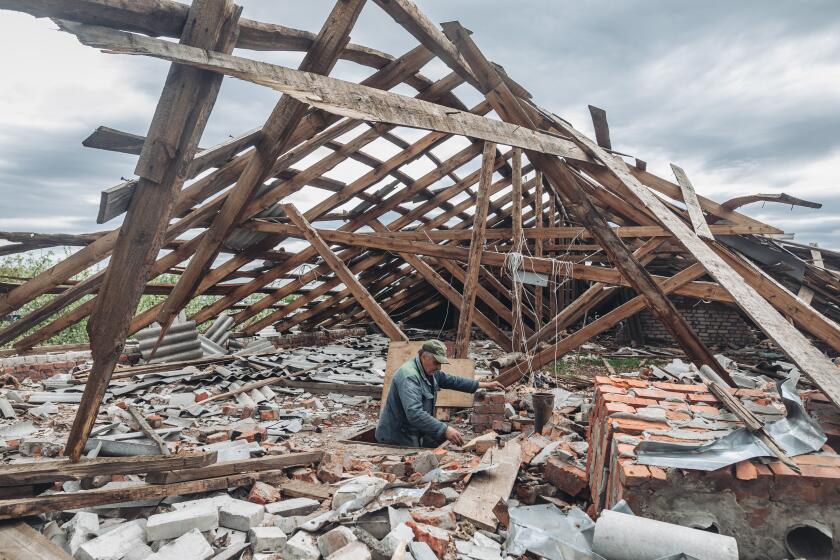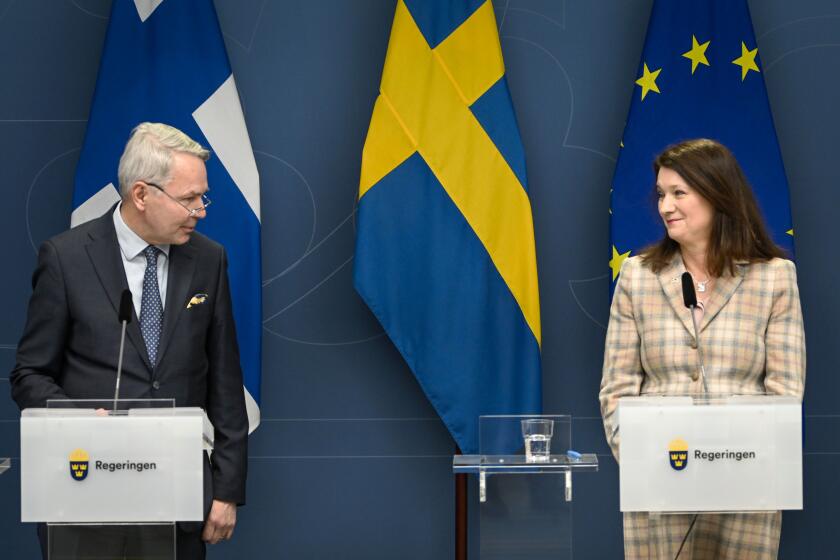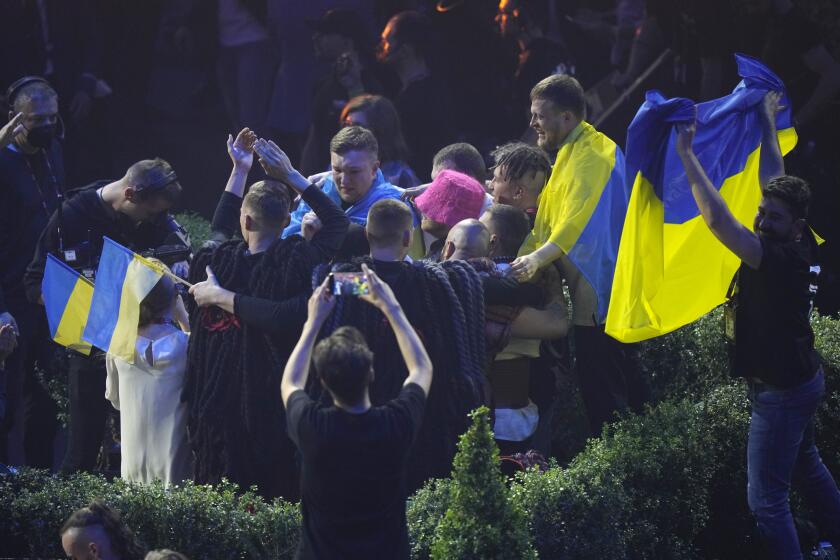Finland and Sweden formally seeking entry into NATO alliance as U.S. welcomes move

LVIV, Ukraine — Signaling what they called a “new era,” leaders of Finland and Sweden said Sunday that they will seek membership in the North Atlantic Treaty Organization within days, a move almost certain to escalate geopolitical tensions arising from the Russian war in Ukraine.
Having dealt a number of significant if limited setbacks to Moscow’s forces, Ukraine expressed renewed optimism over its conduct of the war and the wider ramifications — not the least of which is the likelihood of a larger NATO.
At a joint news conference in the presidential palace in Helsinki, President Sauli Niinisto and Prime Minister Sanna Marin announced the decision by Finland — which has long been a neutral country — to apply for entry into the U.S.-led alliance. The move would significantly alter the transatlantic security architecture in existence since the end of World War II.
“This is a historic day,” Niinisto said. “A new era begins.”
In Berlin on Sunday at a meeting of the foreign ministers of the 30 NATO member states, U.S. officials quickly welcomed Finland’s announcement. “I am very confident that we will reach consensus,” U.S. Secretary of State Antony J. Blinken said.
He made the assertion in answer to reporters’ questions about opposition to NATO expansion from member Turkey, whose resistance is rooted in Scandinavian support for Kurdish separatists. “This is a process, and NATO is a place for dialogue,” Blinken said.
A short time later, the foreign minister of Sweden, Ann Linde, announced her country also would begin a formal application on Monday, after the ruling Social Democratic Party decided after more than a century to drop its policy of military neutrality.
“The Russian invasion of Ukraine has deteriorated the security situation for Sweden and Europe as a whole,” she said. Swedish Prime Minister Magdalena Andersson added: “It is not something against Russia, but is what we think is best for us,” acknowledging that a spate of retaliation including cyberattacks was possible.
Finland shares a more than 800-mile border with Russia, which views any expansion of NATO toward its territory as a grave security threat. Sweden sits on Finland’s western flank and is also partially bordered by the Baltic Sea.
Ukraine’s emergence as a Western ally that could potentially join NATO is one of the major reasons Russian President Vladimir Putin has given for invading Ukraine.
In addition to Finland and Sweden, Georgia, a former Soviet republic, has also placed a bid to join NATO on the table despite Moscow’s vociferous objections.
Officials say Russia is retreating from north of Kharkiv, Ukraine’s second-largest city. Finland and Sweden join a NATO meeting, angering Russia.
NATO officials were meeting in Berlin to consider the moves by Finland and Sweden — whose foreign ministers also attended — as well as other nations to join the alliance. Senior NATO officials have indicated the Nordic countries’ applications would be fast-tracked. Both countries have robust military structures and are considered strong democracies.
Denmark’s foreign minister, Jeppe Kofod, dismissed suggestions that objections from Putin could hinder the alliance from accepting new members.
“Each and every European country has a fundamental right to choose their own security arrangement,” Kofod told reporters.
“We see now a world where the enemy of democracy No. 1 is Putin and the thinking that he represents,” he said.
Through the Cold War and the decades since, nothing could persuade Finns and Swedes that they would be better off joining NATO — until now.
The Finnish president said that he told Putin during a phone call Saturday that the invasion of Ukraine has fundamentally changed “the security environment of Finland,” and said his country will seek NATO membership “in the next few days.”
The Kremlin said Putin warned Niinisto that the relationship between the neighbors could be “negatively affected” if Finland applies to join NATO.
And in a sign of the economic might that Russia wields over much of Europe, the Finnish power company Fingrid said Saturday that Russia cut off electricity supplies to the nation. A representative for the company said that Finland “can cope” and that the power grid would not be interrupted.
European dependence on Russian energy, and efforts to wean countries away from those supplies, were also pressing issues on the sidelines of the NATO meeting in Berlin.
“This is a reliance that’s been built up over many, many decades,” Blinken said. “It’s not going to end overnight, but Europe is clearly on track to move decisively in that direction.”
The hindrance to a unified position, however, comes from Hungary, a member of both NATO and the European Union whose right-wing leader, Viktor Orban, is an ally of Putin and has refused to support Ukraine.
Meanwhile, the British Defense Ministry said Sunday that Moscow’s offensive in Ukraine’s eastern region of Donbas has stalled.
In its latest daily assessment, Britain said that Russia’s advance in the Donbas — where Putin redirected troops last month after a failed assault in Kyiv, the Ukrainian capital — “has lost momentum and fallen significantly behind schedule.”
Despite “small scale initial advances,” the Defense Ministry said, “Russia has failed to achieve substantial territorial gains over the past month whilst sustaining considerably high levels of attrition.”
Russia has suffered losses of about one-third of the ground combat troops committed when it invaded Ukraine on Feb. 24, the British report said. Moscow is “unlikely to dramatically accelerate its rate of advance over the next 30 days,” the Defense Ministry concluded.
Though U.S. military intelligence analysts have not given the same figure of Russian troop losses, they concur in the assessment that the Russian offensive in Ukraine’s crucial eastern industrial heartland has bogged down and is two weeks or more behind where Putin wanted it to be.
“Ukraine can win this war,” NATO Secretary-General Jens Stoltenberg told the foreign ministers meeting in Berlin.
Official Russian accounts have painted a picture of steady advances in the Donbas region, where pro-Russia separatist forces have controlled territory since 2014. This year’s war has seen Moscow largely gain control of the port city of Mariupol, which is part of the Donbas, while seizing other towns in the region.
Ukrainian officials say their forces are counterattacking in the east but concede that a long-term battle is likely.
“The situation in Donbas remains very difficult,” President Volodymyr Zelensky said in an overnight address. “Russian troops are still trying to show at least some victory. On the 80th day of the full-scale invasion, it looks especially insane.”
Ukrainian forces do appear to have forced Russian troops to retreat from the vicinity of Kharkiv, in northeastern Ukraine. The city — Ukraine’s second-most populous, after Kyiv — has faced relentless bombardment since the war began. Much of Kharkiv’s prewar population of 1.4 million has fled the city. But Ukrainian officials say they are pushing Russian forces away from the city.
On Sunday, air-raid sirens sounded before dawn in the western region of Lviv, which has been largely insulated from the conflict — though Russian missiles have periodically hit targets in the area, which is close to the Polish border. The border zone is a key conduit for supplies and military equipment entering Ukraine.
Four Russian missiles hit “a military infrastructure facility” early Sunday in the town of Yavoriv, near the Polish border, an official statement from the Lviv regional government said. There were no victims, authorities said, but the target was “completely destroyed.” Authorities provided no details on what kind of military facility was hit. The missiles were probably fired from the Black Sea, possibly by submarines, Ukrainian officials said.
Amid the grim war news, many Ukrainians on Sunday were celebrating a cultural victory — a trophy for a Ukrainian band in the popular Eurovision Song Contest.
Ukrainian band Kalush Orchestra won the Eurovision Song Contest in the early hours of Sunday in a clear show of support for the war-ravaged nation
Zelensky pledged that his country would endeavor to host the European competition one day in “Ukrainian Mariupol” — the embattled port city now largely under Russian control.
The widespread destruction in Mariupol — along with the displacement of most of the more than 400,000 people who once lived there — has become emblematic of the devastation that the war has brought.
“Our courage impresses the world, our music conquers Europe!” an exuberant Zelensky said in an Instagram post following the Eurovision victory Saturday of Ukraine’s Kalush Orchestra for its song “Stefania.”
The song — a fusion of of rap and traditional folk in a tribute to the mother of the band’s frontman, Oleh Psyuk — has become a kind of anthem for many Ukrainians. Psyuk made an emotional on-stage appeal on behalf of Ukrainian fighters trapped in a besieged steel plant in Mariupol, and the band’s victory was widely seen as a reflection of European support for Ukraine.
“We will do our utmost to one day host the participants and visitors of Eurovision in Ukrainian Mariupol,” Zelensky said. “Free, peaceful and rebuilt!”
McDonnell reported from Lviv and Wilkinson from Washington.
More to Read
Sign up for Essential California
The most important California stories and recommendations in your inbox every morning.
You may occasionally receive promotional content from the Los Angeles Times.














